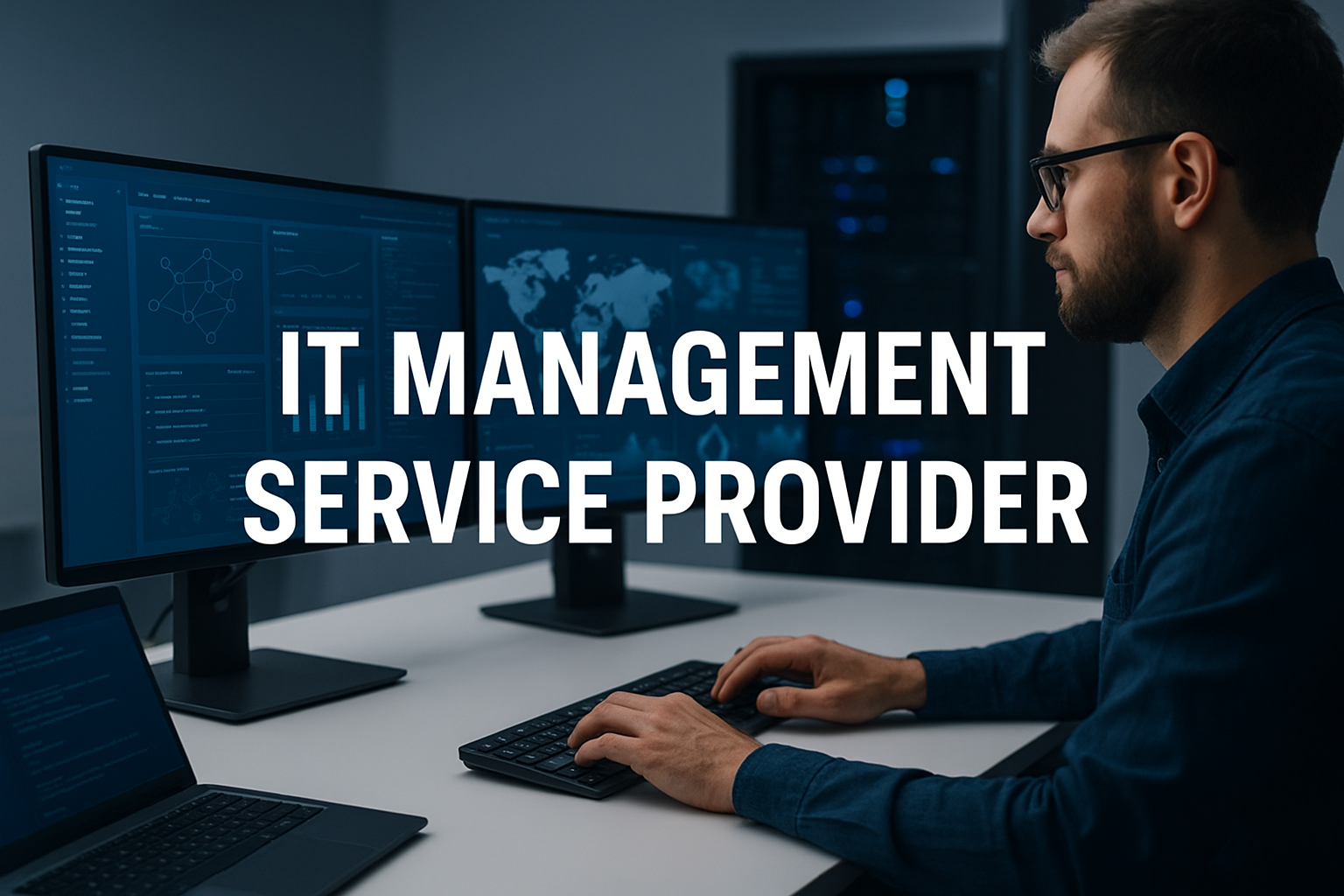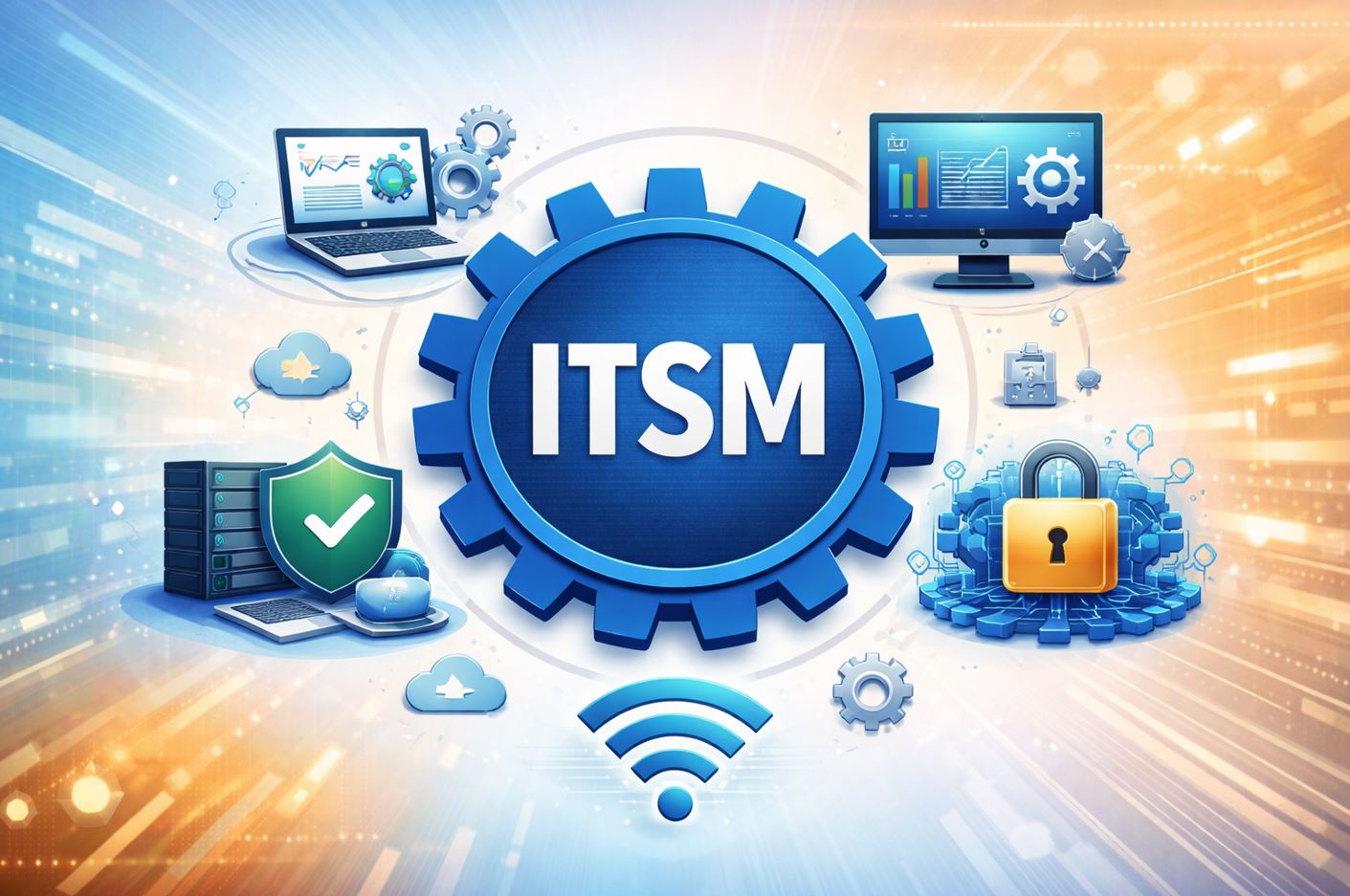What is an IT Management Service Provider?

What is an IT Management Service Provider?
What exactly is an IT Management Service Provider? An IT Management Service Provider, often referred to as an IT Service Management (ITSM) provider, is a company or software platform that delivers tools and services to manage, automate, and optimize IT operations for businesses. These providers help organizations streamline processes like incident management, asset tracking, change management, and service desk support, aligning IT services with business goals. By leveraging ITSM frameworks like ITIL (Information Technology Infrastructure Library), providers such as Freshservice, ManageEngine ServiceDesk Plus, and Zendesk for Service Management enable businesses to reduce downtime, enhance productivity, and improve end-user satisfaction.
Why is this role critical? As businesses increasingly rely on technology, ITSM providers bridge the gap between IT operations and organizational needs, ensuring seamless service delivery. According to MarketsandMarkets, the global ITSM market is projected to grow from USD 10.5 billion in 2023 to USD 22.1 billion by 2028, at a CAGR of 15.9%, highlighting the rising demand for efficient IT management solutions.
Table of Contents
- What is IT Service Management (ITSM)?
- Why Are ITSM Providers Essential for Businesses?
- What functionalities do ITSM providers offer?
- How Does Freshservice Stand Out as an ITSM Provider?
- How Does Freshservice Stand Out as an ITSM Provider?
- What Role Does Zendesk Play in ITSM?
- How Do ITSM Providers Support Small Businesses?
- How Do ITSM Providers Benefit Large Enterprises?
- What Are the Benefits of Using ITSM Providers?
- How Do ITSM Providers Integrate with Other Tools?
- Is Pricing Transparent Across ITSM Providers?
- What Are the Limitations of ITSM Providers?
- How Do ITSM Providers Ensure Security and Compliance?
- What Do Users Say About These ITSM Providers?
- How Do You Choose the Right ITSM Provider?
- FAQs
- Conclusion
Quick Summary
| Takeaway | Explanation |
| Definition of MSP | A Managed Service Provider (MSP) is a third-party company that remotely manages IT infrastructure and services, such as networks, security, and cloud solutions, for businesses. |
| Proactive Approach | Unlike traditional IT support, MSPs focus on continuous monitoring and issue prevention to minimize downtime and enhance system efficiency. |
| Key Services | MSPs offer network management, cybersecurity, cloud services, and technical support, tailored to industries like healthcare, finance, and manufacturing. |
| Cost Efficiency | By outsourcing IT to MSPs, businesses reduce costs compared to maintaining in-house teams, with predictable subscription-based pricing. |
| Scalability | MSPs provide flexible solutions that scale with business growth, adapting to changing IT needs without significant upfront investments. |
| Expertise Access | MSPs deliver specialized knowledge and advanced technologies, enabling businesses to stay competitive and secure without extensive internal resources. |
What is IT Service Management (ITSM)?
What does ITSM entail?
IT Service Management (ITSM) is a structured approach to designing, delivering, and managing IT services to meet the needs of an organization and its customers. It encompasses processes like incident management (resolving disruptions), problem management (addressing root causes), change management (managing updates), and service request fulfillment (handling user requests). ITSM providers like Freshservice, ManageEngine, and Zendesk offer software that automates these processes, ensuring efficiency and scalability.
How does ITSM differ from traditional IT support?
Unlike basic help desk services, which focus on resolving immediate issues, ITSM takes a proactive, holistic approach, integrating automation, analytics, and self-service portals to enhance service quality. This comprehensive framework ensures IT teams align with business objectives, delivering measurable value.
Why Are ITSM Providers Essential for Businesses?
Why do organizations need ITSM providers?
In today’s digital landscape, businesses depend on technology for daily operations, from managing internal IT infrastructure to supporting customer-facing services. ITSM providers streamline workflows, reduce manual tasks, and improve response times, leading to better employee and customer experiences. For instance, platforms like Freshservice and Zendesk enable businesses to handle thousands of tickets efficiently, while ManageEngine offers robust asset management for complex IT environments.
What are the broader impacts?
ITSM tools improve business alignment, ensuring IT supports organizational goals. They also enhance productivity by automating repetitive tasks, increase end-user satisfaction through self-service options, and ensure compliance with regulatory requirements. By reducing downtime and improving problem-solving, ITSM providers help businesses stay competitive in fast-paced markets.
What functionalities do ITSM providers offer?

ITSM platforms like Freshservice, ManageEngine ServiceDesk Plus, and Zendesk for Service Management come equipped with a range of features to optimize IT operations. These include:
- Incident Management: Tools to track, prioritize, and resolve IT incidents swiftly, minimizing disruptions.
- Asset Management: Capabilities to monitor hardware and software assets, including license tracking and configuration management databases (CMDB).
- Self-Service Portals: User-friendly interfaces for employees or customers to submit requests or access knowledge bases independently.
- Automation: AI-driven features for ticket routing, workflow automation, and resolution suggestions to reduce manual effort.
- Integrations: Seamless connectivity with tools like Slack, Microsoft Teams, or CRMs to streamline workflows.
- Analytics and Reporting: Dashboards and reports to track performance metrics, SLAs, and IT service health.
Why are these features vital? They enable businesses to manage complex IT environments efficiently, reduce operational costs, and deliver consistent service quality. For example, Freshservice’s intuitive interface simplifies adoption, while ManageEngine’s robust reporting suits mid-sized firms, and Zendesk’s multichannel support enhances customer-facing IT operations.
How Does Freshservice Stand Out as an ITSM Provider?
What makes Freshservice a leading ITSM solution?
Freshservice, developed by Freshworks, is a cloud-based, ITIL-ready ITSM platform designed for businesses of all sizes, particularly small to mid-sized organizations. Its user-friendly interface, affordability, and robust automation make it a top choice for simplifying IT operations. With over 20,000 customers worldwide, Freshservice excels in delivering an exceptional employee experience through features like AI-powered ticketing and asset management.How does Freshservice benefit users?
Key features include:
- Incident Management: Supports multichannel ticket creation (email, chat, phone) with automated workflows.
- Asset Management: Tracks hardware and software via a built-in CMDB, ensuring visibility into IT resources.
- Self-Service Portal: Allows users to resolve issues independently, reducing ticket volume.
- Integrations: Connects with tools like Slack, Microsoft Teams, and TeamViewer for seamless collaboration.
- Pricing: Starts at $19/agent/month (Blossom plan), with a 21-day free trial, making it accessible for smaller businesses.
What are its limitations?
Freshservice may lack the advanced customization needed for large enterprises, and its AI features are less sophisticated than competitors like ServiceNow. However, its ease of use and affordability make it ideal for organizations seeking rapid deployment.
How Does ManageEngine ServiceDesk Plus Enhance IT Management?
What sets ManageEngine ServiceDesk Plus apart?
ManageEngine ServiceDesk Plus is a versatile ITSM solution catering to mid-sized organizations, offering both cloud and on-premise deployment options. Known for its cost-effectiveness and ITIL-compliant features, it provides comprehensive tools for incident, problem, and asset management, with strong integration capabilities.How does it support IT teams?
Notable features include:
- Comprehensive Service Desk: Manages incidents, problems, and changes with configurable workflows.
- Asset Management: Tracks IT assets with CMDB integration, ideal for complex environments.
- Reporting and Analytics: Offers robust dashboards for performance tracking and SLA management.
- Integrations: Connects with monitoring tools like OpManager, enhancing network visibility.
- Pricing: Quote-based, with a 30-day free trial, making it budget-friendly for mid-sized firms.
What are the drawbacks?
Its user interface can feel outdated compared to modern platforms like Freshservice, and scalability may be limited for very large enterprises. Still, its value and feature depth make it a strong contender.
What Role Does Zendesk Play in ITSM?
How does Zendesk function as an ITSM provider?
Originally a customer service platform, Zendesk for Service Management has evolved into a flexible ITSM solution, particularly for businesses integrating IT and customer support. Its cloud-based platform is known for its intuitive interface and focus on user experience, making it popular among small to medium-sized companies.What are Zendesk’s key offerings?
Features include:
- Multichannel Support: Handles tickets via email, chat, and social media, unifying IT and customer service.
- Knowledge Management: Provides self-service portals and knowledge bases to empower end-users.
- AI-Powered Automation: Freddy, Zendesk’s AI engine, categorizes tickets and suggests resolutions.
- Pricing: Starts at $5/agent/month, with a 14-day free trial, offering cost-effective scalability.
- Integrations: Connects with CRM and customer experience tools for streamlined workflows.
Why choose Zendesk?
It excels in scenarios requiring seamless integration of IT and customer support but may lack the depth of IT-specific features needed for complex environments. Its simplicity and affordability make it a great fit for smaller teams.
How Do ITSM Providers Support Small Businesses?
How do ITSM providers cater to small businesses? Small businesses often lack the resources for complex IT management, making user-friendly and affordable ITSM tools like Freshservice and Zendesk ideal. These platforms offer rapid deployment, minimal training requirements, and cost-effective pricing, enabling small teams to automate ticket management, track assets, and provide self-service options without significant investment.
What’s the impact? For example, Freshservice’s Blossom plan ($19/agent/month) provides essential features like incident management and self-service portals, while Zendesk’s low starting price ($5/agent/month) suits budget-conscious firms. These tools help small businesses improve efficiency, reduce IT-related downtime, and enhance employee satisfaction without needing dedicated IT staff.
How Do ITSM Providers Benefit Large Enterprises?
What advantages do ITSM providers offer large organizations? Large enterprises with complex IT environments require scalable, customizable solutions like ManageEngine ServiceDesk Plus or enterprise-grade platforms like ServiceNow. These tools support multi-cloud environments, advanced automation, and ITIL-compliant workflows, ensuring seamless management of thousands of assets and users.
Why is scalability key? ManageEngine’s on-premise and cloud options allow enterprises to tailor deployments, while its CMDB integration supports intricate asset tracking. ServiceNow, though not detailed here, offers deep customization for large-scale operations but at a higher cost and complexity. These solutions ensure compliance, reduce operational risks, and align IT with strategic goals.
What Are the Benefits of Using ITSM Providers?

What value do ITSM providers bring to organizations? ITSM providers like Freshservice, ManageEngine, and Zendesk deliver a range of benefits that transform IT operations:
- Improved Efficiency: Automation reduces manual tasks, allowing IT teams to focus on strategic priorities.
- Enhanced User Satisfaction: Self-service portals and quick resolution times improve employee and customer experiences.
- Better Business Alignment: ITSM aligns IT services with organizational goals, ensuring technology supports business outcomes.
- Proactive Problem Solving: Analytics and AI identify issues before they escalate, minimizing downtime.
- Compliance and Security: GDPR-compliant platforms ensure data protection and regulatory adherence.
How do these benefits translate to success?
By streamlining processes, ITSM providers help businesses save time, reduce costs, and stay competitive. For instance, Freshservice’s AI-driven ticketing reduces resolution times, while ManageEngine’s reporting ensures compliance with SLAs.
How Do ITSM Providers Integrate with Other Tools?
How do ITSM platforms connect with existing systems? Integration is a cornerstone of modern ITSM providers, enabling seamless workflows across business tools. Freshservice integrates with Slack, Microsoft Teams, and TeamViewer, allowing IT teams to collaborate in real time. ManageEngine connects with monitoring tools like OpManager, enhancing network visibility. Zendesk integrates with CRMs and customer experience platforms, unifying IT and customer support.
Why is integration critical? These connections reduce tool sprawl, streamline data flow, and improve cross-departmental collaboration. For example, Zendesk’s integration with Salesforce ensures IT and customer service teams share data, enhancing service delivery.
Is Pricing Transparent Across ITSM Providers?
How do ITSM providers structure their pricing? Pricing varies based on features, user count, and deployment type. Freshservice offers transparent plans starting at $19/agent/month, with a 21-day free trial. Zendesk’s pricing begins at $5/agent/month, with a 14-day trial, making it highly accessible. ManageEngine uses a quote-based model with a 30-day trial, offering flexibility but less upfront transparency.
What should businesses consider? Transparent pricing, like Freshservice’s tiered plans, helps small businesses budget effectively. Enterprises may prefer custom quotes from ManageEngine for tailored solutions. Evaluating total cost of ownership (TCO), including setup and training, is crucial for informed decisions.
What Are the Limitations of ITSM Providers?
Are there drawbacks to using ITSM providers? While powerful, ITSM platforms have limitations:
- Freshservice: Lacks advanced customization for large enterprises; AI features are less robust than competitors.
- ManageEngine: User interface feels dated; scalability may be limited for very large organizations.
- Zendesk: Limited IT-specific features, less suited for complex IT environments.
How do providers address these? Freshservice focuses on ease of use to offset customization limitations, ManageEngine offers robust support to mitigate interface concerns, and Zendesk prioritizes simplicity for smaller teams. Businesses must weigh these trade-offs against their needs.
How Do ITSM Providers Ensure Security and Compliance?
Are ITSM platforms secure? Security is paramount, especially for handling sensitive IT data. Freshservice, ManageEngine, and Zendesk are GDPR-compliant, with features like encryption and secure cloud hosting. ManageEngine’s on-premise option offers additional control for enterprises, while Freshservice’s AWS-hosted platform ensures robust security. Zendesk’s SOC 2 and ISO certifications provide peace of mind for customer-focused businesses.
Why is this important? Compliance with regulations like GDPR and robust security measures protect businesses from data breaches and legal issues, ensuring trust in IT operations.
What Do Users Say About These ITSM Providers?
What feedback do users provide? User reviews highlight the strengths and weaknesses of each platform:
- Freshservice: Rated 4.4/5 on G2, praised for its intuitive interface and affordability but criticized for limited advanced features.
- ManageEngine ServiceDesk Plus: Rated 4.8/5 on SoftwareSuggest, lauded for its value and reporting but noted for an outdated UI.
- Zendesk: Rated 4.5/5 on G2, appreciated for ease of use and customer service integration but less robust for complex IT needs.
Why does this matter? High user satisfaction, as seen in reviews, indicates reliability and effectiveness. However, businesses should test platforms via free trials to ensure alignment with specific needs.
How Do You Choose the Right ITSM Provider?
What factors should guide your choice? Selecting an ITSM provider depends on:
- Business Size: Freshservice and Zendesk suit small to mid-sized firms; ManageEngine supports mid-sized to larger organizations.
- Budget: Zendesk’s low entry price ($5/agent/month) is ideal for startups, while ManageEngine’s quote-based model suits custom needs.
- Features: Prioritize incident management, automation, or integrations based on your workflows.
- Scalability: Ensure the platform grows with your business, especially for enterprises.
- Ease of Use: Platforms like Freshservice require minimal training, ideal for smaller teams.
How can you evaluate options? Leverage free trials (Freshservice: 21 days, ManageEngine: 30 days, Zendesk: 14 days) to test functionality and fit. Compare user reviews on platforms like G2 to gauge real-world performance.
FAQs

What does an ITSM provider do? An IT Management Service Provider offers software and services to manage IT operations, including incident management, asset tracking, and service desk support, aligning IT with business goals.
What are the differences between these platforms? Freshservice is user-friendly and affordable for small businesses; ManageEngine offers robust features for mid-sized firms; Zendesk excels in integrating IT and customer support.
Is my data safe with these tools? Yes, Freshservice, ManageEngine, and Zendesk are GDPR-compliant, with secure cloud hosting and encryption to protect sensitive data.
How much do these tools cost? Freshservice starts at $19/agent/month, Zendesk at $5/agent/month, and ManageEngine uses quote-based pricing. All offer free trials (21, 14, and 30 days, respectively).
Are these tools suitable for smaller firms? Yes, Freshservice and Zendesk are ideal for small businesses due to their affordability, ease of use, and rapid deployment.
Which tools can they connect with? Freshservice integrates with Slack and Microsoft Teams, ManageEngine with OpManager, and Zendesk with CRMs like Salesforce, enhancing workflow efficiency.
Conclusion: Why ITSM Providers Are Essential for Modern Businesses
Why should you invest in an ITSM provider? IT Management Service Providers like Freshservice, ManageEngine ServiceDesk Plus, and Zendesk for Service Management transform IT operations by automating processes, enhancing user experiences, and aligning technology with business goals. Whether you’re a small business seeking affordability or an enterprise needing scalability, these platforms offer tailored solutions to reduce downtime, improve efficiency, and ensure compliance. With transparent pricing, robust integrations, and high user satisfaction, they empower organizations to thrive in a tech-driven world. Ready to explore? Visit https://freshservice.com, https://manageengine.com, or https://zendesk.com to start a free trial and find the perfect ITSM fit.



